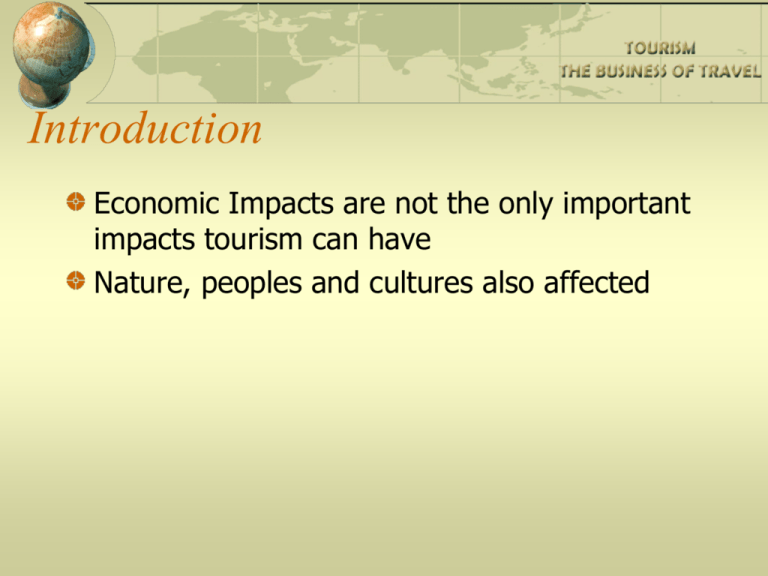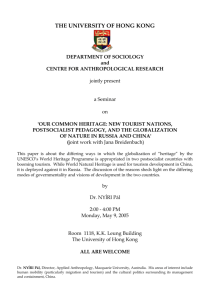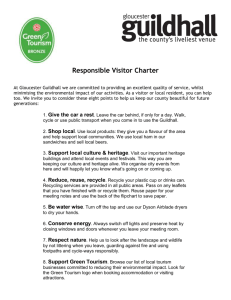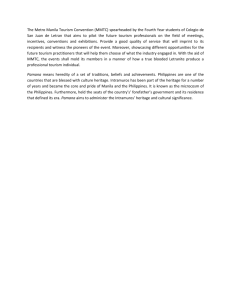Introduction - WikiEducator
advertisement

Introduction Economic Impacts are not the only important impacts tourism can have Nature, peoples and cultures also affected Social and Cultural Impacts of Tourism Society is a community, nation or broad grouping of people who have common traditions, institutions, activities and interests Culture is the practices of a society Host community concept Resource 1: The local residents who serve and interact with guests Resource 2: Community's economic system Resource 3: Community's infrastructure and government services Resource 4: Natural resource of the community and its outlying area Culture Culture is to a nation what a strong sense of identity is to a person A nation pride in its culture should keep it from being overexposing itself towards any industry At the same time, that same strong sense of cultural identity can lead to fostering of a tourism product that is unique and different Social and Cultural Impacts of Tourism, continued Social and cultural benefits of tourism Learn about each other Sharing of tastes and different ways of thinking Can generate “critical mass” of interest Improved standard of living Preservation of area’s natural and historical sites Using culture to attract tourists Material goods Daily life activities Special expressions of culture Cultural Heritage If our cultural heritage is to be used for tourism, the society must first value dearly the heritage and understand the desired value As well, the society must preserve and protect its heritage, and develop the community where aspects of this heritage lies. Cultural heritage tourism must be seen as opportunity for both hosts and tourists Cultural Heritage Architectural and ancient structures Language Religion Folklore: dances, songs, tales Food Traditional crafts and technologies The environment: beaches, reefs, forests, trails Review of Social Benefits Tourism broadens education Tourism promotes international peace and understanding Tourism breaks down barriers Tourism, if planned properly, reinforces preservation of heritage and traditions It can enhance appreciation of one’s culture and heritage It creates new leisure and rec. activities Unintended Consequences of Tourism on Culture Social carrying capacity Number of people that a society can bear without substantial damage to its culture Consequences to cultures Overcrowding Clash of unfamiliar behaviors Resentment of residents from need to share resources with visitors Unintended Consequences of Tourism on Culture, continued Consequences to less developed, lower income cultures Demonstration effect Disproportionate wages from tourism compared to traditional occupations Problem of Crime Due to increase in number of potential victims Due to resentment and envy of visitors Correlation between number of visitors and amount of crime Effect on native language Decline in moral conduct of local people Four Extremes Relating to the Behavior Preferences of the International Tourist 1. Relaxation versus activity 2. Familiarity versus novelty 3. Dependence versus autonomy 4. Order versus disorder Barriers to Travel 1. Cost 2. Lack of time 3. Health limitations 4. Family stage 5. Lack of interest 6. Fear and safety Benefits of Tourism - Social Broadens educational and cultural horizons Improves quality of life higher incomes and improved standards of living Justifies environmental protection and improvement Provides tourist and recreational facilities that may be used by a local population Benefits of Tourism - Cultural Reinforces preservation of heritage and tradition Visitor interest in local culture provides employment for artists, musicians and other performing artists enhancing cultural heritage Breaks down language barriers, sociocultural barriers, class barriers, racial barriers, political barriers, and religious barriers Creates a favorable worldwide image for a destination Promotes a global community Promotes international understanding and peace Disadvantages of Tourism Social Creates social problems Degrades the natural physical environment and creates pollution Degrades the cultural environment Threatens family structure Commercializes culture, religion, and the arts Creates misunderstanding Creates conflicts in the host society Contributes to disease, economic fluctuation, and transportation problems




